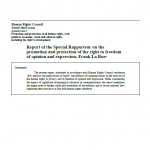
The present report analyses the implications of States’ surveillance of communications for the exercise of the human rights to privacy and to freedom of opinion and expression. While considering the impact of significant technological advances in communications, the report underlines the urgent need to further study new modalities of surveillance and to revise national laws regulating these practices in line with human rights standards.
